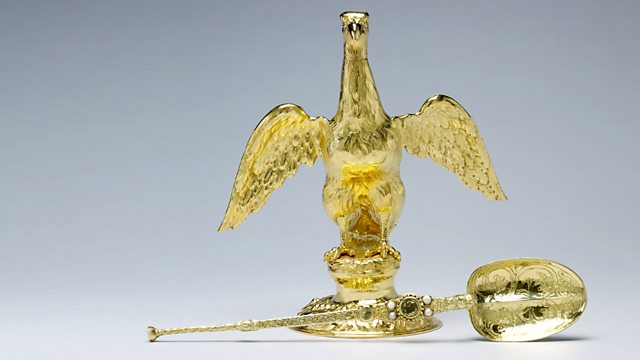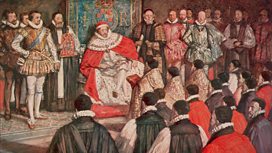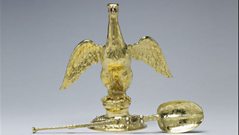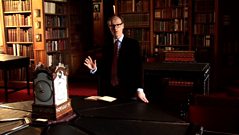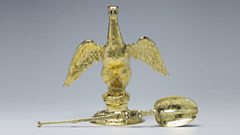Faith
Will Gompertz explores the monarch's relationship with the church through the centuries, seeing how hard rulers have worked to ensure religion stayed on their side. From Feb 2012.
The Royal Collection is one of the most wide-ranging collections of art and artefacts in the world and provides an intriguing insight into the minds of the monarchs who assembled it.
In this series, Â鶹Éç Arts Editor Will Gompertz encounters dozens of these unique objects - some priceless, others no more than souvenirs - each shedding light on our relationship with the monarchy and giving a glimpse into the essential ingredients of a successful sovereign.
A thousand years of monarchical history tell us that one crucial relationship for a monarch is with the church. In today's programme, Will sees how hard successive rulers have worked to make sure religion stayed on their side. It has not always been easy. The relationship with the church has through the centuries been so fraught as to threaten the survival of a sovereign.
Will begins with an object used - only for a brief but crucial moment - in the coronation of the present Queen, then encounters an object that dates from the time of William the Conqueror and that has anointed some of England's most famous Kings and Queens in the eyes of God. He reads Henry VIII's robust defence of the Catholic faith, written just a few years before political expediency drove him to break with the Papacy; and sees a landscape painting that provides a possible insight into the private faith of Queen Victoria.
Along the way, Will enlists the help of curators from the Royal Collection, Lord Indarjit Singh, historians Sir Diarmaid MacCulloch, Anna Whitelock and the Archbishop of Canterbury, Rowan Williams.
Producer: Sarah Taylor.
Last on
![]()
Listen to a selection of programmes and clips related to Faith.
Clips
-
![]()
The Art of Monarchy - Faith - the Coronation Spoon and Ampulla
Duration: 01:47
-
![]()
Henry VIII's defence of Catholicism
Duration: 01:21
Coronation Spoon, 12th century, with Ampulla

The Coronation spoon is the only piece of the Coronation regalia to survive the melt of the Commonwealth. It was listed among St Edward's Regalia at Westminster Abbey in 1349, suggesting it has been connected with Coronations since an early date. The Ampulla is a vessel in the form of an eagle used for holding consecrated oil. Made for the Coronation of Charles II in 1661. The Sovereign is anointed with consecrated oil during the Coronation ceremony.
Ìý
From: England Date: 1250-1300 & 1661
Material: Silver gilt & Gold
Size: 267 mm & 207 x 104 mm Ìý
Ìý
Ìý
Ìý
The Coronation Pen

The Coronation Pen made by Francis J.C. Cooper. Used by Her Majesty The Queen to sign the Coronation Oath in Westminster Abbey.
Ìý
From: England. Donated by the Scrivener's Company
Date: 1953
Material: Ivory, enamel, gold and gemstone
Size: 230 mm Ìý
Ìý
Treatise against Martin Luther, written by Henry VIII

Treatise on the subject of the defence of the seven sacraments against Martin Luther, written by Henry VIII (1491-1547). This treatise was written by Henry VIII defending the Catholic Church against Luther's Protestant teachings.
Ìý
From: England
Date: 1521
Material: Bound in dark brown calf
Size: 172 x 21 mm Ìý
Ìý
Order of Service for the Coronation of William III and Mary II

Order of Service for the Coronation of William III (1650-1702) and Mary II (1662-1694). The Coronation service was revised in accordance with the new constitutional and protestant monarchy heralded by the joint reign of William III and Mary II. The service is signed by both the King and Queen.
Ìý
From: England
Date: 1689
Material: Bound in black morocco leather
Size: 173 x 117 x 10 mm
Ìý
Ìý
The Sanctuary by Sir Edwin Landseer

The Sanctuary by Sir Edwin Landseer (1803-1873). This painting reflects the more sentimental nature of religious imagery in the 19th century and symbolises the struggle of life and the peace of salvation.
Ìý
From: England. Acquired by Queen Victoria as a birthday gift for Prince Albert
Date: 1842
Material: Oil on canvas
Size: 918 x 1835 mm Ìý
Ìý
Ìý
Sword and scabbard presented to Edward VII by the Maharajah of Jaipur

Sword and scabbard set with 719 diamonds. Presented to Edward VII by the Maharajah of Jaipur.
Ìý
From: India
Date: c.1902
Material: Gold, coloured enamel, diamonds, steel
Size: 885 mm (sword); 797 mm (scabbard) Ìý
Ìý
Ìý
More from Radio 4: The Divine Right of Kings

Melvyn Bragg and guests discuss the Divine Right of Kings. The idea that a monarch could heal with his touch flowed from the idea that a king was sacred, appointed by God and above the judgement of earthly powers.ÌýThe idea resided deep in the culture of 17th century Britain affecting the pomp of the Stuart Kings, the writings of Milton and Shakespeare and the political works of John Locke. It is a story that involves witches, regicide, scrofula, Macbeth, miraculous portraits and some of the greatest poetry in the English language.
Ìý
More from Radio 4: Leonard Rosoman

Leonard Rosoman's career saw him travel the world as an Official War Artist in the Second World War. He is also a member of the Royal Academy, an illustrator and teacher. After the war Leonard went back to teaching, first in London then to Edinburgh College of Art in 1948, and later on to the Royal College of Art where he met his most memorable student - David Hockney.
Ìý
More from Radio 4: The Dissolution of the Monasteries

Melvyn Bragg and guests discuss Henry VIII and the Dissolution of the Monasteries. Was Henry’s decision to destroy monastic culture in this country a tyrannical act of grand larceny or the pious destruction of a corrupt institution?
Ìý
More from Radio 4: The Commission

The King James, or Authorised, Version of the Bible remains the most widely published text in the English language. It has been called the "noblest monument of English prose" and has been recognised for centuries as both a religious and literary classic. James Naughtie tells the story of how and why King James VI of Scotland and I of England decided on a new translation of the Bible.
Ìý
Broadcasts
- Sat 25 Feb 2012 10:30Â鶹Éç Radio 4
- Sat 12 Aug 2017 07:30Â鶹Éç Radio 4 Extra
- Sat 12 Aug 2017 17:30Â鶹Éç Radio 4 Extra
- Sun 13 Aug 2017 05:30Â鶹Éç Radio 4 Extra
Featured in...
![]()
Shakespeare - Stratford Chalice
Shakespeare - Stratford Chalice
Podcast
-
![]()
The Art of Monarchy
Will Gompertz examines objects in the Royal Collection that define the British monarchy.
